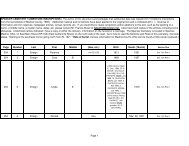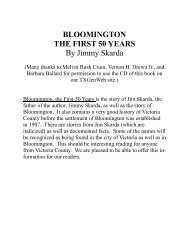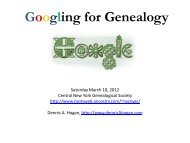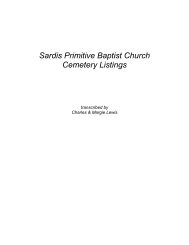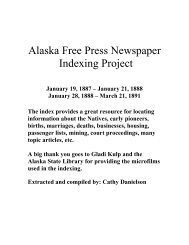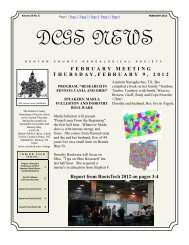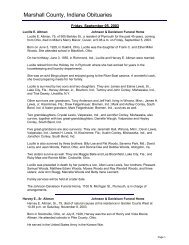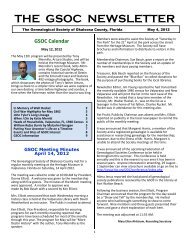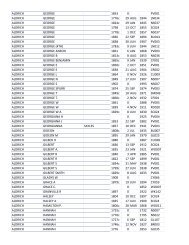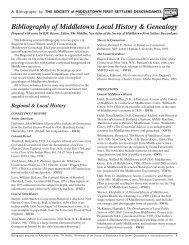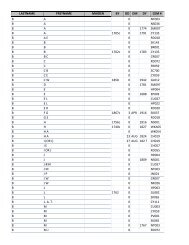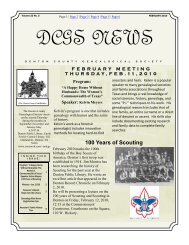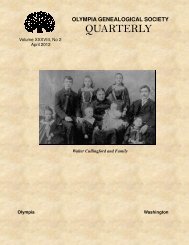Getting to the Roots of Your Family - RootsWeb - Ancestry.com
Getting to the Roots of Your Family - RootsWeb - Ancestry.com
Getting to the Roots of Your Family - RootsWeb - Ancestry.com
You also want an ePaper? Increase the reach of your titles
YUMPU automatically turns print PDFs into web optimized ePapers that Google loves.
o Wills<br />
o Sales, Assignments or Conveyances<br />
o Rent Charges<br />
Before searching, you must know:<br />
• The time period in which you want <strong>to</strong> find a deed.<br />
• The names <strong>of</strong> <strong>the</strong> people you want <strong>to</strong> look for.<br />
• It is helpful but not necessary <strong>to</strong> know a barony, parish, or county where <strong>the</strong> people lived or<br />
owned property.<br />
• To search <strong>the</strong> County Index, you need <strong>to</strong> know <strong>the</strong> name <strong>of</strong> <strong>the</strong> <strong>to</strong>wnland.<br />
A three step process is used <strong>to</strong> locate <strong>the</strong> Memorial or abstract <strong>of</strong> Deed.<br />
Step 1. Search <strong>the</strong> Surname Index and/or <strong>the</strong> County Index <strong>to</strong> <strong>the</strong> Registry <strong>of</strong> Deeds.<br />
• The Surname Index is really a gran<strong>to</strong>r index. It only lists those people who are disposing <strong>of</strong> <strong>the</strong><br />
property.<br />
• The County index is an index by <strong>the</strong> name <strong>of</strong> <strong>the</strong> <strong>to</strong>wnland. It is arranged by county and <strong>the</strong>n<br />
alphabetically by <strong>the</strong> first letter in <strong>the</strong> name <strong>of</strong> <strong>the</strong> <strong>to</strong>wnland. After 1828 it is arranged first by<br />
county, <strong>the</strong>n barony, and <strong>the</strong>n <strong>to</strong>wnland (<strong>to</strong>wnlands where <strong>the</strong> barony was not identified are in<br />
<strong>the</strong>ir own index).<br />
• There is a volunteer project <strong>to</strong> index <strong>the</strong>se records, available at<br />
http://freepages.genealogy.rootsweb.ancestry.<strong>com</strong>/~registry<strong>of</strong>deeds/by_number/indexed.htm .<br />
The project is not yet <strong>com</strong>plete, so if not found on this website, you will need <strong>to</strong> use <strong>the</strong> micr<strong>of</strong>ilm<br />
indexes.<br />
• To find film numbers, search <strong>the</strong> FHLC using a “title” search and <strong>the</strong> words Transcripts <strong>of</strong><br />
memorials <strong>of</strong> deeds, conveyances and wills, 1708-1929.<br />
• Search <strong>the</strong> index by time period and by name or by county and <strong>to</strong>wnland name.<br />
• Obtain <strong>the</strong> volume and page number from <strong>the</strong> index.<br />
Step 2. Search for <strong>the</strong> Memorial or Abstracts <strong>of</strong> Deeds.<br />
• To find film numbers, search <strong>the</strong> FHLC using a “title” search and <strong>the</strong> words Transcripts <strong>of</strong><br />
memorials <strong>of</strong> deeds, conveyances and wills, 1708-1929.<br />
• Obtain <strong>the</strong> micr<strong>of</strong>ilm number for <strong>the</strong> volume you need.<br />
• Look up <strong>the</strong> abstract by volume and page number. The page numbers are <strong>of</strong>ten wrong, but <strong>the</strong><br />
deed numbers are not. Deed numbers may skip but <strong>the</strong>y are in order.<br />
Step 3. Locate records not available at <strong>the</strong> <strong>Family</strong> His<strong>to</strong>ry Library.<br />
• The original records are kept at <strong>the</strong> Registry <strong>of</strong> Deeds, Henrietta St, Dublin 1, Ireland.<br />
FREEHOLDERS REGISTERS<br />
A freeholder held his property ei<strong>the</strong>r in fee (owns it), or by lease for one or more lives (such as <strong>the</strong> term <strong>of</strong><br />
his life or <strong>the</strong> term <strong>of</strong> three lives named in <strong>the</strong> lease). A tenant who held land for a defined period such as 31<br />
years or 300 years was not considered a freeholder. The value <strong>of</strong> <strong>the</strong> freehold (amount varied over time)<br />
entitled <strong>the</strong> freeholder <strong>to</strong> vote. Books recording freeholders who registered <strong>to</strong> vote are called freeholders<br />
registers, while records <strong>of</strong> voters and who <strong>the</strong>y voted for are called Poll Books.<br />
These records start in 1727, but excluded Catholics until 1793. Freeholders registers are arranged by <strong>the</strong><br />
county and sometimes <strong>the</strong> barony. A freeholders register may contain information about each freeholder and<br />
freehold:<br />
1. Name <strong>of</strong> freeholder 2. Abode (address) <strong>of</strong> freeholder



